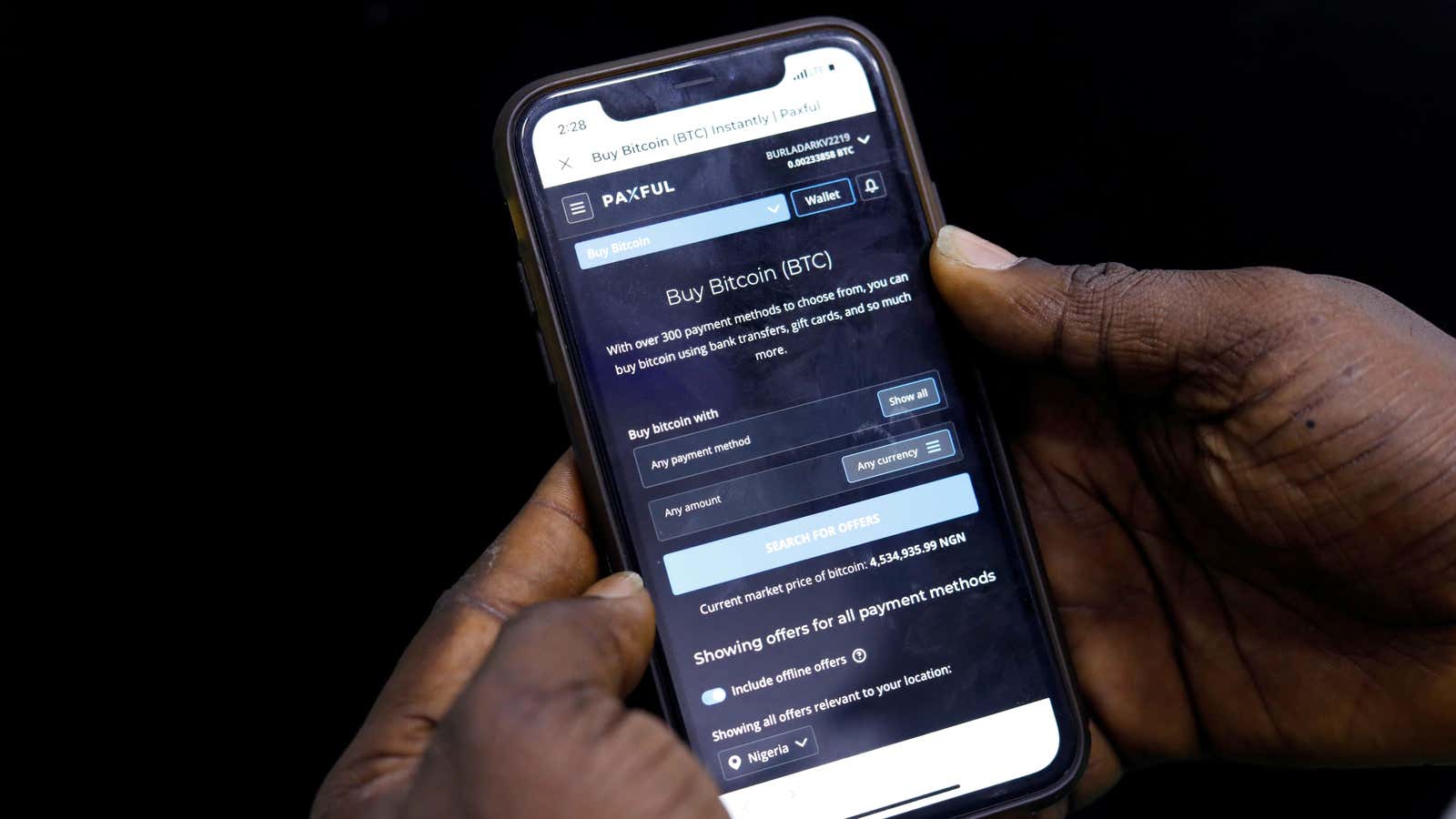The latest crackdown by Nigeria’s central bank on cryptocurrency has elicited outrage and confusion in a country where virtual currency has boomed in the last five years. It’s also emblematic of the struggle by financial regulators the world over to regulate the supercharged space of digital currencies.
On Friday afternoon, the Central Bank of Nigeria (CBN) issued a circular asking commercial banks and other financial institutions to close accounts transacting in, or operating on, cryptocurrency exchanges. All deals involving cryptocurrency are now “prohibited” with “severe regulatory sanctions” awaiting erring outfits. The CBN also asked banks to identify “persons and or entities transacting in or operating cryptocurrency exchanges within their systems and ensure that such accounts are closed immediately.”
The circular follows a 2017 warning issued by the bank against the use of cryptocurrencies.
While the new directive doesn’t explicitly void the legality of virtual currencies, it goes a step further than the 2017 guidance, by making trading them in Nigeria basically impossible. While the 2017 note prohibited banks from doing crypto deals, it did allow them to have exchanges as customers, provided they met certain requirements. Language in the latest guidance appears to make dealing on any exchanges illegal.
The bank’s position since 2017 did not stop the meteoric rise of cryptocurrency in the country. By some estimates, Nigerians have traded over $500 million in bitcoin in the last five years, making it the second largest bitcoin market after the US.
Crypto’s instability notwithstanding, it provides a worthwhile hedge for Nigerian investors, considering the country’s uncertain monetary policy, currency fluctations, and recent collapse in oil prices. The fact that digital currencies are protected from inflation, capital controls, or exchange rate depreciation has seen many Nigerians turn to them for financial trades such as cross-border remittances and e-commerce. Startups have sprung up to facilitate these trades.
Bitcoin was also used to fund activists during last year’s widespread protests against police brutality in the country, after the government and Central Bank allegedly blocked donations coming through local payment platforms.
“CBN’s move likely reflects an attempt to get remittance dollars to flow back into the official channels to support the exchange rate,” one economist who requested anonymity told Quartz.
Unlike traditional currencies, crypto is not subject to monetary policy, and like several central banks around the world, the CBN has taken aim at the currency’s volatility and opaqueness. These criticisms are not without merit: crypto has been used to facilitate fraudulent and questionable activities, including a 2017 Ponzi scheme in which an estimated 3 million Nigerians lost 18 billion naira ($47 million).
However, moves to have it regulated have been protracted. Some African countries like Algeria, Morocco, and Libya have laws prohibiting cryptocurrency outright. South Africa, on the other hand, is proposing new regulations that protect its citizens from frauds using the platforms.
Nigeria seemed to be on that path when its Securities and Exchange Commission recognized the validity of digital currencies last September, thus providing investors with hope that regulation and security would follow. But the apex regulator’s new rules looked to have stymied those efforts.
Some fintech platforms facilitating crypto-related transactions have complied so far with the CBN’s approach. Binance, through its owner Changpeng Zhao, made an announcement on Twitter asking users to “withdraw your NGN as early as possible to avoid potential channel issues.”
Former vice-president Atiku Abubakar was one of the critics of the policy over the weekend, saying he believes it would stifle an already unhealthy economy. “This is definitely the wrong time to introduce policies that will restrict the inflow of capital into Nigeria, and I urge that the policy to prohibit the dealing and transaction of cryptocurrencies be revisited,” Abubakar wrote on Twitter, calling for regulation instead.
